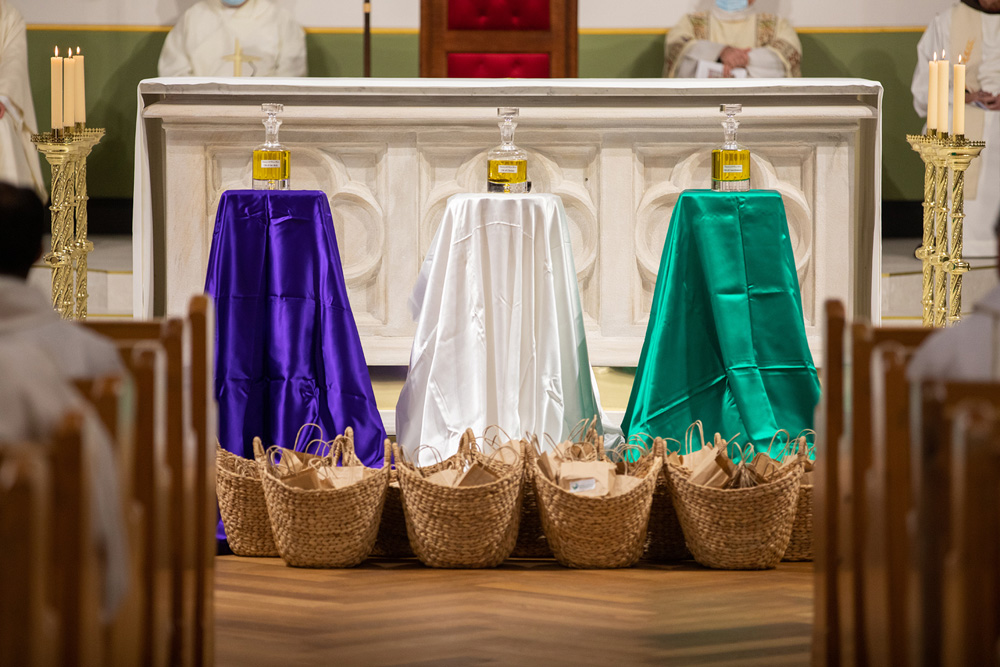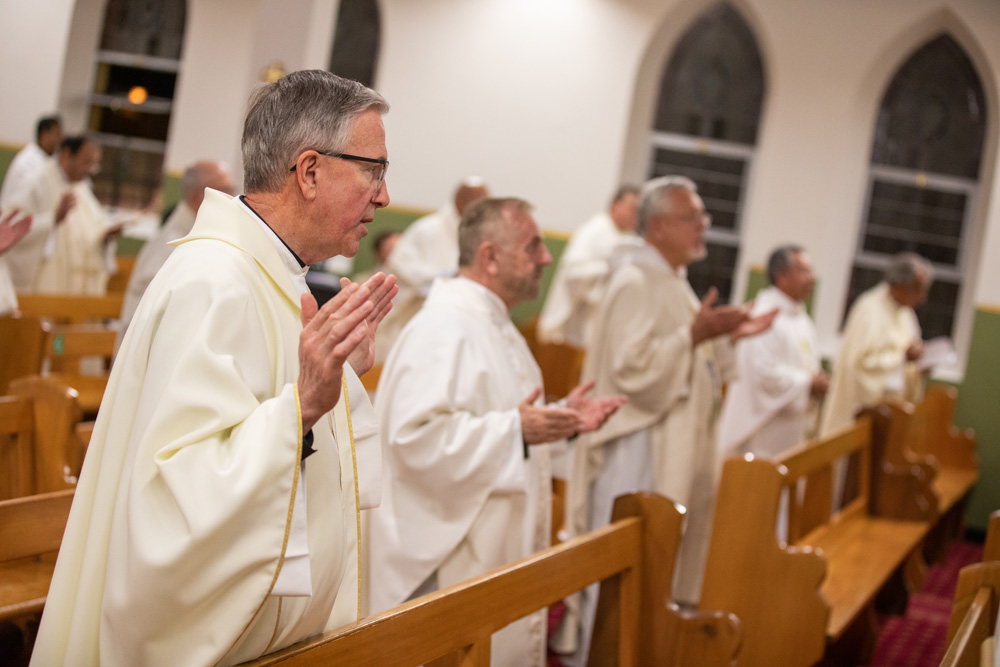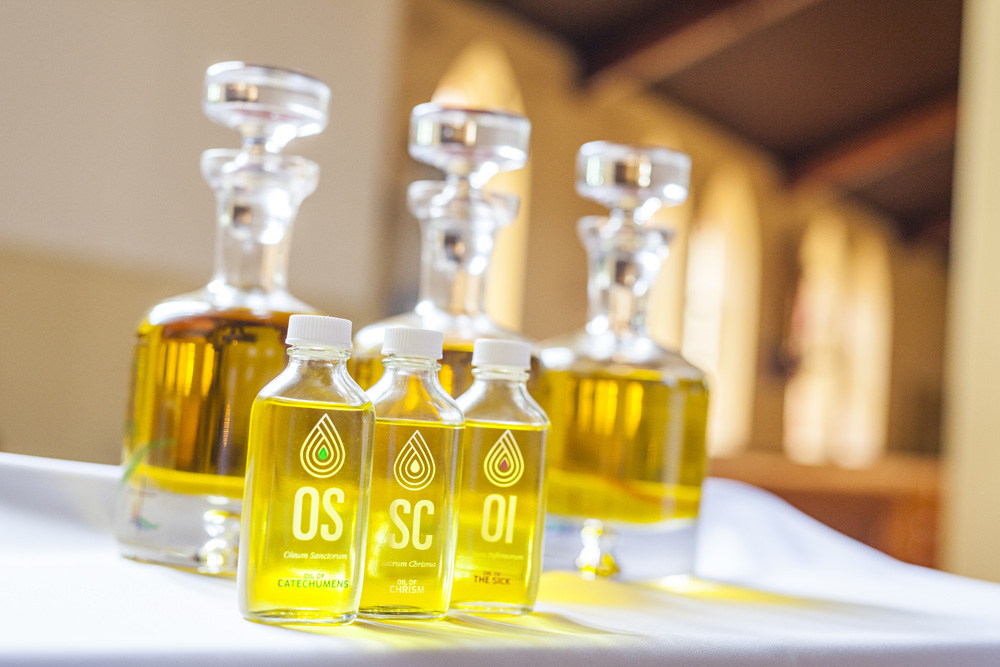Chrism Mass 2023

The Chrism Mass is celebrated every year before Easter by the people of God in cathedrals all over the world. This liturgical event is both ancient and symbolically rich, and it holds immense significance in the Church, rivaled only by Christmas and Easter. Although not widely known, attending the Chrism Mass can deepen one’s understanding and appreciation of the sacramental life of the Church.
This year’s Chrism Mass will be celebrated at St Francis Xavier Cathedral, Wollongong on Tuesday 4 April at 7pm, and all are warmly invited to attend.
What is the Chrism Mass?
The Chrism Mass is a significant event in the Catholic Church where the bishop and all the priests in the diocese bless the oils used in the sacraments for the upcoming year. Traditionally, this blessing occurred during the Holy Thursday Mass as it commemorates Christ’s establishment of the ministerial priesthood. However, Pope Pius XII decided to separate the two celebrations during his pontificate, giving the oil blessing its own Mass. Although dioceses worldwide celebrate the Mass on different days, the essence of the event remains rooted in the priesthood, highlighting the unity of the priests with their bishop.
The Chrism Mass welcomes not only the clergy but also encourages the laity to participate, highlighting the powerful display of unity among the people of God when the bishop, priests, and lay faithful come together. In his homily during the 2022 Chrism Mass, Pope Francis emphasised that being a priest is a great grace not only for the priest themselves but also for the people they serve.
In his homily for the 2022 Chrism Mass, Pope Francis said, ‘Being priests, dear brothers, is a grace, a very great grace, yet it is not primarily a grace for us, but for our people.’
The Chrism Mass and the priesthood

Ministerial priesthood nevertheless has a specific mission, and the Chrism Mass provides an important opportunity to reflect on the grace and gift of this mission. Without the priesthood, after all, we would not have the sacraments.
In his 2006 Chrism Mass homily, Pope Benedict XVI spoke about the newness of this priesthood and how it differs from ancient Jewish priesthood, observing that ‘new worship’ is based on the knowledge that ‘God makes a gift to us, and, filled with this gift, we become his: creation returns to the Creator …
So it is that the priesthood also became something new: it was no longer a question of lineage but of discovering oneself in the mystery of Jesus Christ. He is always the One who gives, who draws us to himself.
Jesus is ‘the supreme high priest’ (Hebrews 4:14), and the ministerial priesthood shares in this in a unique and specific way.
What are the oils?

Three oils blessed during the Chrism Mass:
- Oleum Sanctorum: The oil of catechumens (also known as the oil of exorcism, which is used in Baptism)
- Oleum Infirmorum: The oil of the infirm (used in the Anointing of the Sick)
- Sacrum Chrisma: The oil of holy chrism (used in the sacraments of Baptism, Confirmation and Holy Orders).
The oil of holy chrism holds great significance as it is utilised in sacraments that involve anointment with the Holy Spirit. This mixture of olive oil and balsam, an aromatic resin, serves as a reminder that, as Christians, we are called upon to emit the ‘fragrance’ of Jesus Christ, or “the smell of life leading to life” (2 Corinthians 2:14, 16).
Why are the oils significant?
Oils have had traditionally significant importance in ancient Jewish rituals. Although commonly used for everyday purposes such as cooking and lighting fires, they were also used for anointing individuals and consecrating objects for sacred purposes, often for priests, prophets, or kings.
Anointing with oils signified God’s blessing, strength, and favor, as exemplified in Psalm 45:8: “Therefore God, your God, has anointed you with the oil of gladness above other kings.” This tradition was also carried over into early Christian worship, as they recognised not only the significance of oils but of who Jesus was. In the New Testament, Jesus is depicted as the ultimate priest, prophet, and king, who came to provide his people with abundant life. Interestingly, the term “messiah” translates to “anointed one.”
The Catechism of the Catholic Church says, “From the beginning until the end of time the whole of God’s work is a blessing” (§1079). God’s sole purpose is to bless his people with abundant life, which Jesus brings through the sacraments. The oils symbolise this blessing.
Through blessing and utilising the oils to bless others, we witness and experience Christ’s divine work of blessing those who are lost and distant with his abundant life.
All are warmly invited to join with us for this year’s Chrism Mass.
Tuesday 4 April 2023, 7pm
St Francis Xavier Cathedral, Wollongong


